On the last day of my trip to Louisiana, my cousin's friend Kenny graciously volunteered to take us out on his friend's boat. Because no Louisianan can conceive of a boat in the water without fishing line dangled over the side, we took fishing gear.
It was a gorgeous day, with bright sparkling sunshine and waterbirds going about their business all around us. I know there were fish underwater, because they jumped in the air periodically, but they were all genius fish who knew better than to eat the shrimp I had speared on my hook. To get to our fishing spot, we had traveled down a canal with banks that featured a string of fishing camps that actually looked like fishing camps, as opposed to the palace where we were sleeping.
There were "For Sale" signs stuck in the muck, in case other people wanted to vacation on the water. (And I mean on the water.) As best I could tell, the "land" being sold poked out of the water during all phases of the tide, but that was about it. The camps were built on pilings, and you could tell that owners were using various strategies to build up their plots, including dumping oyster shells out in the yard. Those folks either brought the shells in as fill, or they eat a lot of oysters. I, for one, rather like the idea of eating my way to higher ground.
The notion of building on pilings, then building up the land around your home, made me think of Venice. The notion of raising the level of the land with oyster shells made me think of the Native Americans, who were doing that very thing long before Columbus showed up. The notion of sleeping in...no, the notion of walking in...one of those mildewy cabins gave me the willies, but I did admire the ingenuity of people who built them out of whatever spare building materials they could haul out on their boats. Most of them had air conditioners protruding from the walls, powered by generators that are stored in strongboxes in the yard.
I don't think this ingenuity extended to plumbing. I'm sure they had plenty of water to cook and wash with, because there were various collection systems set up to store rainwater in barrels. However, we saw no pipes beneath the raised buildings to carry sewage away, so I figured we were looking at a latrine situation. One cabin actually had a couple of toilets sitting out in the yard, for all the world to see. We did not fish anywhere in this area.
Here is a pic, but understand that my camera seems to magically make them look more beautiful. I wish it worked that way on me.
Do you notice that there is no one visible in this photo? And no visible boats other than our own? Kenny thought this was odd on a weekend. We should have paid attention to this oddity.
We pulled into an open bay and commenced fishing. About the time we got our hooks wet, a Fish and Wildlife boat appeared. This was a negative turn of events, because we'd conferred over whether Cheryl and I should get fishing licenses, and Kenny said he'd never been stopped, not once, in the twenty years since he'd moved to Louisiana. It just didn't make any sense to pay for licenses, when we were only going to fish for an hour or so, then go look for the oil spill.
Bad decision.
The really tragic part of this fishing tale is that, for the only time in my entire life, I actually do have a valid fishing license...in Florida. Another tragic part of this story is that we were fishing in restricted water, so I got two citations. (I have no idea how much these citations are going to cost me, because I'm waiting for my laryngitis to subside before I try to call and ask. I'll also be begging for mercy, because Plaquemines Parish requires you to appear in court for such things. If they don't waive that requirement for this Floridian, I'll be driving back to Louisiana on September 27. Not that returning to the land of good music and beignets is necessarily a bad thing...)
The most tragic part of this, however, is that the restricted water extends so very far. We were in the wrong. We knew there were restrictions and we certainly should have checked for them. (And I shoulda got a local fishing license.) But none of us had any inkling that we were so close to the oil spill.
Here are the hardworking and very nice public servants, in the very act of declaring me an interstate criminal. That's my cousin Cheryl in the foreground. She's just an intrastate criminal.
After this, we went back to the camp to drop Cheryl off, because she wasn't feeling well. Then Kenny and I headed back out. We'd confirmed with the Fish and Wildlife officers that the restrictions were just on fishing. We were free to take the boat anywhere we liked, as long as we didn't fish. I have put my criminal days behind me, so I made sure we didn't run afoul of the law again.
We went down the same canal, heading south. Past the spot where we got our citations, we started seeing moored boats, encircled by boom. We saw skiffs ferrying lifejacketed workers hither and yon. We saw a barge loaded with disposal containers, collecting oily waste. Two big shrimp boats were coming in, and Kenny said that they were fitting those with boom instead of nets, to sweep the oil off the water. Here are a few scenes from the trip down the canal.
Take a good look at those pictures. You can see a large commitment in terms of people and equipment. But then look at the wide open marshland and open water. The area affected is just so huge that it swallows all that effort whole.
We followed the canal until it opened into Barataria Bay. I was still looking all around me for oil, but the boat's sides were clean. (Which was good, since it was borrowed.) And the workboats were all clean, too. Then Kenny said, "Look at the grass."
All along the shoreline of the bay, several inches of oil darkened the base of the grasses. That was all, just stained grass, as far as the eye could see. I have no idea how deep into the wetlands that staining extended.
The water of the bay looked clean--no sheens, no free product on the surface. Maybe the oil had come in with the tide, then left as the tide changed, leaving behind a tremendous area of damaged wetland. Or maybe the hardworking cleanup workers had successfully skimmed the bay clean. But you can't skim a swamp, and you can't rip out several parishes worth of fouled grass.
Those grasses hold together the marshes that protect New Orleans and all the people of south Louisiana. They are the nurseries for the seafood we all eat. By diverting the Mississippi and its silty floodwaters, we have starved the marshes, and they are receding. They can no longer withstand the natural battering given by hurricanes. It seems unlikely in the extreme that they can bounce back from this.
I wish I could show you a photo that depicts the enormity of what is happening in the Gulf of Mexico, but you can get those on TV and in the newspaper and on the internet. I can only show you a snapshot of a stained shoreline, taken by an engineer/writer/non-photographer with her cell phone. It's up to you to extrapolate it, imagining square miles of land laid waste.
We headed back to the camp, waving at workers all the way. Now that we'd noticed the staining on the grass, we saw a lot of it as we made our way back up the canal, but eventually it faded away. It was only then that I got a good face-full of the odor of raw oil.
Why hadn't I smelled it when I was looking at it? I have no idea. The chemical engineer in me thinks that the oil is pretty weathered by the time it hits the upper reaches of Barataria Bay. It has had days and miles to lose the volatile fractions that are easiest to smell. Then what was I smelling? I don't know. Maybe the volatile fractions evaporating from the oil that has freshly spewed out of the earth are swept in quickly, by sea breezes. Maybe that explains the odd reports of petroleum odors here in north Florida, presumably far from the action. And maybe it explains the fact that I smelled oil in my car as I drove to New Orleans on I-10, miles inland from the disaster on Pensacola's beaches.
Another thing that strikes this chemical engineer is the problem of separating all that oil from the environment, once it has been released. Chemical engineers take whole classes in separation techniques--distillation, leaching, extraction--but you can't distill the Gulf of Mexico. And I have no idea how you'd extract oil from a living swamp without killing it. It seems that if BP and the agencies regulating them had really considered the consequences of a failure of the blowout preventer, even if the likelihood of such a thing were tiny, then someone somewhere would have designed a system with better contingency planning, in case the unthinkable happened.
Much has been written about the ongoing tragedy in the Gulf of Mexico. What can I add to that mountain of reporting? I think I can offer perspective.
I got in my car last Friday and drove all day without escaping the massive influence of this event. I spent Friday and Saturday watching many dedicated people work feverishly to mitigate the effects of it. We've all watched for nearly two months while hardworking and intelligent people fail to keep the disaster from getting worse. I'm not sure that the human mind is wired to grasp the enormity of the affected area.
Just because aerial photos of the oil spill will fit on your TV screen does not mean that the problem is manageable. We are only human. We can only do so much. This is a sobering thought.
As I sit here typing this narrative, and watching the news, and wondering how bad this thing will get, I feel vulnerable. And I feel small.
Sometimes you really don't want to know how books are made.
Friday, June 11, 2010
Trip to the Oil Spill, Part III--Oil, as far as the eye can see
Subscribe to:
Post Comments (Atom)
About Me
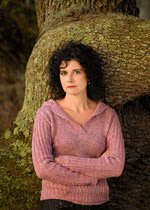
- Mary Anna Evans
- Mary Anna Evans has degrees in physics and engineering, but her heart is in the past. Her series character, Faye Longchamp, lives the exciting life of an archaeologist, and Mary Anna envies her a little. Faye Longchamp's growing list of adventures include Artifacts, Relics, Effigies, Findings, Floodgates and, coming in October, Strangers. Mary Anna is a co-founder and board member of the Anhinga Writers' Studio. The Studio presents an annual summer workshop in Gainesville, Florida, providing writing instruction and networking for fiction and nonfiction authors of all levels of experience. For information on this year's summer workshop, visit www.anhingawriters.org.
Followers
Blog Archive
-
▼
2010
(124)
-
▼
June
(21)
- Writing Tips for the Practical-Minded #6: Take ca...
- Writing Tips for the Practical-Minded #5: Verbs R...
- Writing Tips for the Practical-Minded #4: The Lov...
- Writing Tips for the Practical-Minded #3: I know ...
- Writing Tips for the Practical-Minded #2: Know wh...
- Thirty days, thirty pearls of writing wisdom...
- Why is there a ladder in my kitchen?
- First review of STRANGERS :)
- A Very Timely Tome
- Elegance at Galatoire's
- A Most Pleasant Way To Do The Right Thing
- Making sausage in another locale...
- A Matter of Perspective: A Novel-writing Engineer...
- More sausage, coming your way...
- The Oil Spill Story, All in One Place
- Trip to the Oil Spill, Part III--Oil, as far as th...
- Just a little housekeeping...
- A Novelist/Engineer's Perspective on the Oil Spill...
- Eyewitness to the oil spill
- I'm serious about my research
- A Tale of Titles, Part Quattuor
-
▼
June
(21)


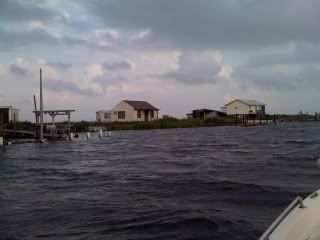
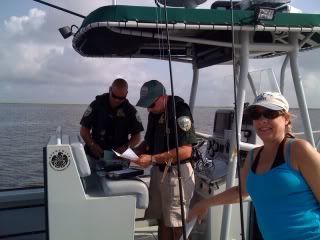
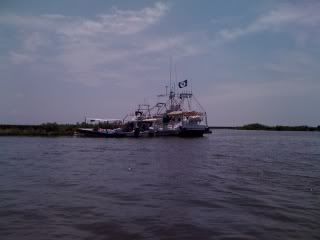
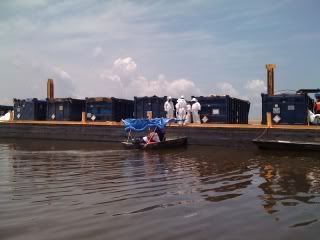
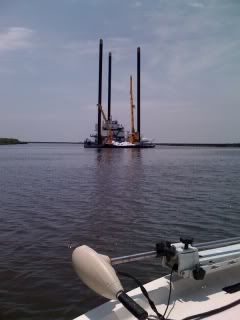
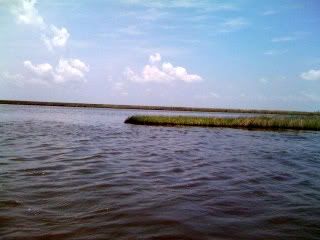












"Just because aerial photos of the oil spill will fit on your TV screen does not mean that the problem is manageable."
ReplyDeleteThis sentence sums up the situation beautifully. I am going to put it on my Facebook page with a link to your blog.
Best regards,
Jayne Barnard
(who lived on the Louisiana Gulf Coast a lifetime ago)
Thanks, Jayne. I've heard from another reader who lives in the affected area, and I'll be posting a link to her blog tomorrow. If anybody has a pertinent link they think I might want to post, send me an email: maryannaevans@yahoo.com
ReplyDeleteGreat idea that Jayne had. I am doing the same. Wonderful story on such a tragic topic. Thanks.
ReplyDelete